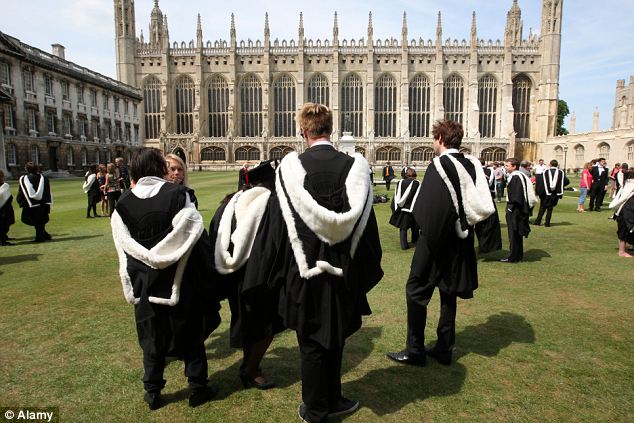- Male students will be allowed to wear skirts, while females will be allowed to choose to wear the classic men’s dress code of suits and white bow ties
- Changes introduced after pressure from students’ union LGBT group
- Oxford University introduced similar dress code changes last year
John Stevens
Daily Mail
August 31, 2013
For centuries Cambridge students have worn their distinctive graduation robes to receive their degrees from the ancient university.
But now the sight of graduates in their academic dress could be a little different after it rewrote its traditional dress code to avoid upsetting transgender students.
From October, male students will be allowed to wear skirts to pick up their degree certificates while female students will be able to choose to wear men’s suits and white bow ties.
Under the old rules, men had to wear dark suits with a white shirt, white bow tie and academic bands with black shoes and dark socks when they attended graduation.
Women could either wear a black dress , suit or skirt with a white shirt and smart shoes. They were also asked to cover their legs and arms.
The dress codes were strictly enforced and students who broke the rules could be refused graduation.
But the centuries old rules based on gender will be dropped when the new academic year starts in October.
Students will still be required to dress smartly for their graduations, but they will have the freedom to choose what clothes they wear underneath their academic gowns and hoods.
The reforms have been introduced after a campaign by the student union’s Lesbian, Gay, Bisexual and Transgender group.
The group said that the requirement for graduates to dress in the clothes traditionally associated with their sex was ‘distressing’ for some students.
Charlie Bell, President of the Cambridge University Student Union LGBT+ group, said: ‘After a number of discussions at CUSU LGBT+, we decided it was time to act to ask the university to remove the gendered nature of their advice for graduation dress.
‘This has now been done through the Council, and I am delighted at how easy it has been, and how helpful the university has been throughout.
‘It’s a pleasure, at times like this, to belong to a university which not only talks the talk about equalities, but walks the walk too. I hope the colleges follow suit and that the gender label for graduation becomes truly something of the past.
 Daily Stormer The Most Censored Publication in History
Daily Stormer The Most Censored Publication in History



